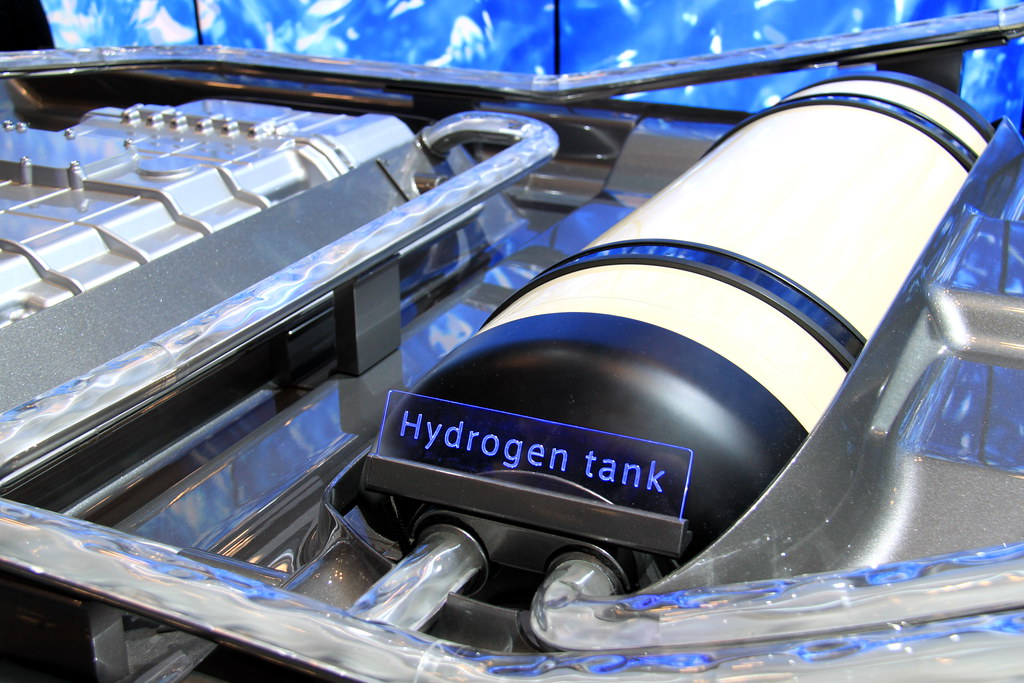
Hydrogen Fuel Cell at 2014 NY International Auto Show – Flickr
Hydrogen’s potential as an emission-free fuel for transportation, power generation, and industrial purposes is nothing new; however, interest in the technology has increased in recent years. Some energy professionals say hydrogen will finally have its moment, driven by the trend towards cleaner hydrogen production, the need for additional tools to address climate challenges, and hydrogen’s potential in hard-to-decarbonize sectors. On March 24, OurEnergyPolicy hosted a panel discussion examining the role of hydrogen in the energy sector.
The webinar covered the production and uses of hydrogen, current economics, and policies needed to support the continued growth of the industry. In discussing production, panelists addressed the hydrogen color classification system, noting that it is not always the best measure of environmental impact, and even hydrogen produced from fossil fuels can have a better environmental impact than burning fossil fuels directly (see more in our Twitter thread). In addition to electricity production, hydrogen can replicate the experience of driving a gasoline or diesel-fueled vehicle in terms of range and time to refuel. It also has significant energy storage potential and can be transported using existing infrastructure with some modifications.
In terms of economics, panelists discussed hydrogen’s status as a mature industry as well as the difference between the various production methods. Hydrogen is currently produced at roughly $1–$7/kg, depending on the method, and will continue to see price reductions for various types of production, especially green hydrogen, as the industry addresses challenges of scale. In addition to process improvements, the industry could be further helped by stable policies, such as tax credits for hydrogen vehicles and infrastructure, and ensuring that projects are technology-agnostic with respect to achieving the goal of reducing emissions.
OurEnergyPolicy’s 3/24/21 Webinar – The Role of Hydrogen
1) What use for Hydrogen do you think would be of the most benefit to the energy sector?
Hydrogen should not be used for powering passenger vehicles. 95% of hydrogen today is made from steam methane reforming so it is a fossil fuel. “Green” hydrogen can be made… Read more »
I agree with this generally, especially that we should first use renewable hydrogen to replace fossil hydrogen for industrial and renewable fuel production purposes. The hydrogen for aviation fuels and… Read more »
The route to renewable hydrogen leads through hydrogen made by reforming of fossil fuels — with CCS. Once it’s produced, the. provenance of hydrogen is irrelevant to subsequent use. What… Read more »
Long term storage to backup intermittent wind and solar. However, wind and solar make no sense when you consider the reliability of nuclear generated electric power. Hydrogen as a transportation… Read more »
I agree, except that I’m not really sold on hydrogen as a transportation fuel even with appropriate infrastructure. It’s just not very efficient.
The chemical efficiency is built into the pricing. If it competes with gasoline great, if it costs more per mile than electric then we have to consider the ease of… Read more »
$1/kg hydrogen is made from methane and is, therefore, a fossil fuel. “Green” hydrogen costs $3~4/kg to make. But the price of hydrogen at the pump is $14/kg! A Tesla… Read more »
Hydrogen should be made from renewable energy, either by splitting water (electrolizing) for instance from off-shore wind, solar, or even by hydropower if the electricity cannot be absorbed by the… Read more »
There’s an immediate and much-needed role for hydrogen for providing flexible zero-carbon power generation. For at least the next decade, that role will be most economically and expeditiously served by… Read more »
Excellent points. The problem is that the U.S. since the 1970s has found it difficult to be rational and cooperate in any controversial area. We would be at the head… Read more »
Hydrogen use is dependent upon cost. For chemical uses such as fertilizer production, there are no options and thus these uses are not price sensitive. For energy uses, cost is… Read more »
2) What federal or state policies, if any, should be adopted to support the development of the energy-focused hydrogen industry?
Fund R&D to lower the cost of producing green and blue hydrogen,
Hard to disagree with that, but there is ongoing R&D in those areas by private companies. Not clear whether special policy help is really needed, or whether it would skew… Read more »
Agreed! Here is a report that James Hansen and I prepared that discusses why Fee & Dividend is the most effective carbon pricing policy:
https://www.ourenergypolicy.org/resources/why-fee-and-dividend-will-reduce-emissions-faster-than-other-carbon-pricing-policy-options/
As with any new and emerging energy resource, hydrogen production and use needs certain medium term incentives to help the industry accelerate and grow. The US is one of the… Read more »
In 2009, Senator Specter (on the EPW Committee) tried to introduce a bill to enhance Us transportation fiuelsecurity in an efficient market based way. At http://www.werbos,com/oil.htm, I have posted the… Read more »
There are three classes of hydrogen applications in a low-carbon world. The first is where require hydrogen chemical properties are required. Today that is in the production of ammonia fertilizer,… Read more »
Green hydrogen is what’s going to be needed to dramatically reduce carbon emissions in the power sector, industrial processes, and transportation sectors where electrified options are not viable. It will… Read more »
The Gallery of Clean Energy Inventions is linked at https://app.box.com/v/CLEANENERGYEXHIBIT. The Gallery of Clean Energy Inventions exhibits profiles of 25 Larger Generators, 34 Smaller Generators, 26 Advanced Self-Powered Electric Vehicle… Read more »